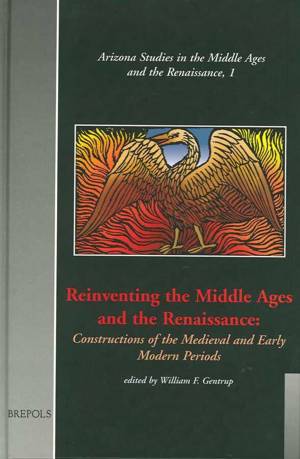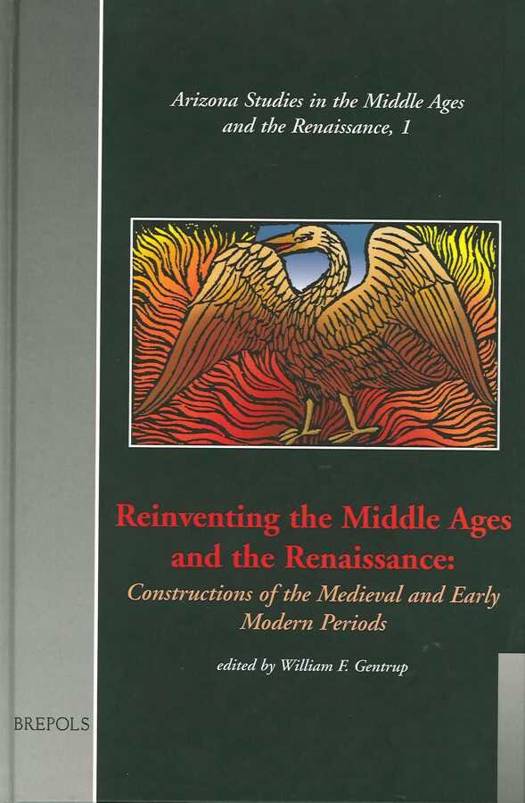
Bedankt voor het vertrouwen het afgelopen jaar! Om jou te bedanken bieden we GRATIS verzending (in België) aan op alles gedurende de hele maand januari.
- Afhalen na 1 uur in een winkel met voorraad
- In januari gratis thuislevering in België
- Ruim aanbod met 7 miljoen producten
Bedankt voor het vertrouwen het afgelopen jaar! Om jou te bedanken bieden we GRATIS verzending (in België) aan op alles gedurende de hele maand januari.
- Afhalen na 1 uur in een winkel met voorraad
- In januari gratis thuislevering in België
- Ruim aanbod met 7 miljoen producten
Zoeken
Crossing Boundaries
Issues of Cultural and Individual Identities in the Middle Ages and the Renaissance
Sally McKee
Hardcover | Engels
€ 37,10
+ 74 punten
Omschrijving
The essays collected here have in common the concept of boundaries, which is defined according to discipline, and movement through boundaries. The essays cover a range of topics and periods. The first section consists of literary approaches to boundaries, ranging widely in subject matter from Norman drama to sixteenth-century goodnight ballads. The second section includes mainly historical studies of such topics as social mobility in Geoffrey of Monmouth's twelfth-century History of the Kings of Britain, post-1453 Byzantine identity, and Milanese Renaissance musical genres. Individually and as a group, the essays contribute fresh insights into well-known and some less familiar works of the Middle Ages and the Renaissance. Contributions include: Linda Georgianna, 'Geoffrey of Monmouth's Historia regum Britanniae: lessons in self-fashioning for the bastards of Britain'; Robert L.A. Clark, 'Eve and her audience in the Anglo-Norman Adam'; John Damon, 'Seinte Cecile and Cristes owene knyghtes: violence, resignation, and resistance in the Second Nun's Tale'; Elaine R. Miller, 'Linguistic identity in the Middle Ages: the case of the Spanish Jews'; Emily Steiner, 'Medieval documentary poetics and Langland's authorial identity'; Patricia Marby Harrison, 'Religious rhetoric as resistance in Early Modern goodnight ballads'; Jami Ake, 'Mary Wroth's willow poetics: revising female desire in Pamphilia to Amphilanthus'; Annabel Patterson, 'The human face divine: identity and the portrait from Locke to Chaucer'; Jonathan Harris, 'Common language and the common good: aspects of identity among Byzantine emigres in Renaissance Italy'; Nolan Gasser, 'Beata et venerabilis Virgo: music and devotion in Renaissance Milan'; Elspeth Whitney, 'Sex, lies, and depositions: Pierre de Lancre's vision of the witches' sabbath'; Laura Hunt Yungblut, 'Straungers and aliaunts: the un-English among the English in Elizabethan England'.
Specificaties
Betrokkenen
- Auteur(s):
- Uitgeverij:
Inhoud
- Aantal bladzijden:
- 295
- Taal:
- Engels
Eigenschappen
- Productcode (EAN):
- 9782503508184
- Verschijningsdatum:
- 15/01/1999
- Uitvoering:
- Hardcover
- Formaat:
- Genaaid
- Afmetingen:
- 164 mm x 246 mm
- Gewicht:
- 630 g

Alleen bij Standaard Boekhandel
+ 74 punten op je klantenkaart van Standaard Boekhandel
Beoordelingen
We publiceren alleen reviews die voldoen aan de voorwaarden voor reviews. Bekijk onze voorwaarden voor reviews.









